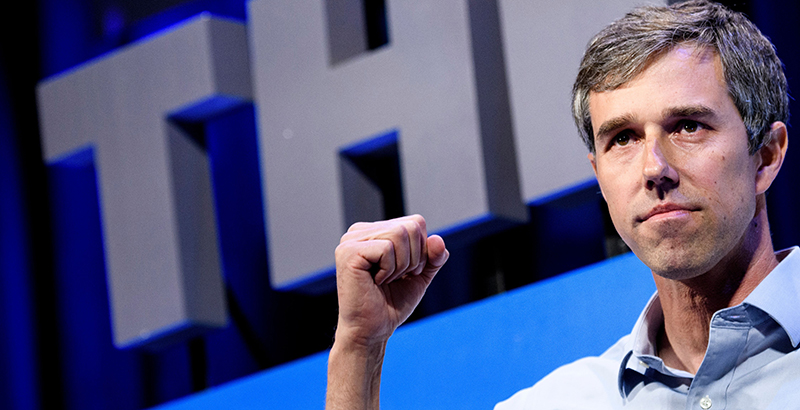Catherine Brown, Former Adviser to Hillary Clinton, on the Mistakes Made by Progressive Education Reformers — and Why Beto O’Rourke Is Right About Charter Schools

Earlier this month, CNN reported that in 2012 Beto O’Rourke said that charter schools “were a good idea.” The network headlined this comment as if it were an embarrassment. That same week, an analysis showed that students from high-performing charter schools are completing college much more quickly than their peers. This juxtaposition speaks volumes about the disconnect between evidence and politics in education policy today.
There is no question that progressive education reformers like me made mistakes over the past decade as we moved aggressively to try to close the long-standing achievement and opportunity gaps. We were at times heavy-handed, top down and tone deaf in our approach. We tried to do too much too fast. We placed too much emphasis on standardized tests, which we viewed as a fair, objective yardstick, to measure the success of schools and teachers in serving all students, and too little emphasis on collaboration and community engagement. The resulting political backlash has been intense, and results of these reforms have been mixed.
But there is one policy championed by education reformers that has been an unqualified success: support for high-performing charter schools.
Unlike some of us in the education reform policy community, the best charter schools actually did learn about the importance of engaging with the community and listening to its perspective. And it would be a tragic setback for the disadvantaged students they serve if progressives abandoned them now.
There is simply no other educational strategy that is reliably changing the life trajectory of students from poor backgrounds.
The Uncommon Schools network is on track to match or exceed the wealthiest American districts over the next few years when it comes to graduating its alumni from four-year colleges. Forty-five percent of alumni of KIPP high schools, the nation’s largest high-performing network, have bachelor’s degrees. YES Prep Public Schools’ rate is slightly higher, and 71 percent of alumni are currently in college. Best of all, the results in some networks are getting better each year.
Consider Siawaa Antwi, a Philadelphia student who has struggled with homelessness, poverty and the death of her father. She attended the college preparatory charter school Freire and, in January, received a full scholarship to Bryn Mawr. She’s fighting her way to a better life, and the generations who come after her will reap the rewards.
These schools and networks that help students like Antwi are able to live up to their potential because they have created systems and structures to recognize and respond to their failures and to grow and improve year after year. When KIPP realized many of its alumni were dropping out of college, it researched why and created systems to help match its alumni with colleges that are better fits, and to better support its alumni financially, academically and socially as they strived to get to and through college.
When Mastery Schools realized it was struggling to find the teaching staff it needed, it created a residency program that gives prospective teachers hands-on experience while inculcating them in the network’s values and approach to teaching. When Achievement First Public Charter Schools realized that it wasn’t achieving the outcomes it set out to, it redesigned its approach to give students more agency over their learning.
Again and again, these organizations have proved themselves to be agile, mission-driven and able to make a substantial dent in the biggest problem facing our schools today: the achievement and opportunity gaps between high- and low-income students, and between black and Hispanic students and their white peers.
The charter sector is not a monolith. Quality is uneven. There are a lot of bad actors, and many charter schools are of poor quality. For-profit virtual charters pay their executives handsomely while delivering wildly subpar results. Some charters discipline students inappropriately. Others counsel students out who are struggling instead of providing the attention and support those students need to succeed.
Huge lessons have been learned — the hard way. Charters work best when policymakers are vigilant about setting a high bar to entry for all charter schools. They must create strong authorizers that only approve applications that meet high standards and demonstrated educational and community needs. They must move swiftly to close schools that aren’t meeting their fiscal responsibilities or delivering on their academic or other promises. They must invest in and support traditional school districts. And — most importantly — they should grow models, charter and traditional, with a proven record of improving outcomes for students from low-income backgrounds.
Democratic contenders for the presidency have already proposed a range of ideas for how to improve educational outcomes, and they will continue to lay out their visions on this fundamental issue over the next year and a half. While the candidates may differ in some of the specifics, they share a belief and core value that our society must do better by children of color and students from low-income families.
Expanded access to health care, early learning and college are essential elements of that agenda. High-performing charter schools, which are a proven strategy to break intergenerational poverty and help students living in poverty ascend into the middle class, ought to remain so too. And the real embarrassment today is progressives turning their backs on the schools that work for the people they are supposed to serve.
Catherine Brown is a former education policy adviser to presidential candidate Sen. Hillary Clinton and Rep. George Miller.
Get stories like these delivered straight to your inbox. Sign up for The 74 Newsletter

;)
